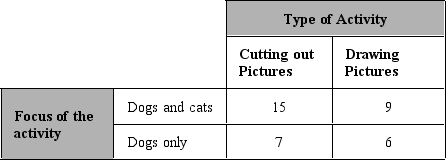Dr.Elder was interested in the way people recognize objects as members of categories.For example,what makes us recognize a dog as being a dog and not a cat? More specifically,he was curious as to whether people think about categories in a more complex way if they contemplate an "opposite" category first.For example,does a person think differently about the category of "southern" if they first think about the category of "northern"? He is also curious as to whether people categorize differently if they are exposed to category members compared with generating category members.Dr.Elder has four groups of participants (with 30 people in each group) .In Group A,participants were told to cut out pictures of dogs and cats from magazines.In Group B,participants were told to cut out pictures of just dogs from magazines.In Group C,participants were told to draw pictures of cats and dogs.In Group D,participants were told to draw pictures of just dogs.After doing this for 30 minutes,participants in all groups were asked to list the attributes that define the "dog" category.Having a higher number of attributes listed was considered to be an indication of thinking about the category in a more complex way.The results of his study are below.

-Which of the following could NOT be said of the focus of activity variable in Dr.Elder's study?
Definitions:
Retention
The ability to keep or hold onto information, objects, or qualities over time.
Head Injury
Physical trauma to the head, which can lead to various symptoms and conditions, from minor concussions to severe brain damage.
Source-Monitoring Error
A type of memory error where an individual misattributes the origin of a memory, confusing the source from which information was acquired.
Retrograde Amnesia
A loss of memory access to events that occurred, or information that was learned, before an injury or the onset of a disease.
Q1: Your professor says that researchers do not
Q18: If researchers measure every member of a
Q20: When examining an association in which one
Q21: Dr.Morimoto is curious as to whether exposing
Q25: Which of the following is true of
Q26: When determining mediation,how many steps are necessary?<br>A)Two<br>B)Three<br>C)Four<br>D)Five
Q34: In evaluating Dr.Oswald's study,you question the construct
Q35: Which of the following types of study
Q35: In which of the following studies is
Q46: Name two consequences of journalists reporting on